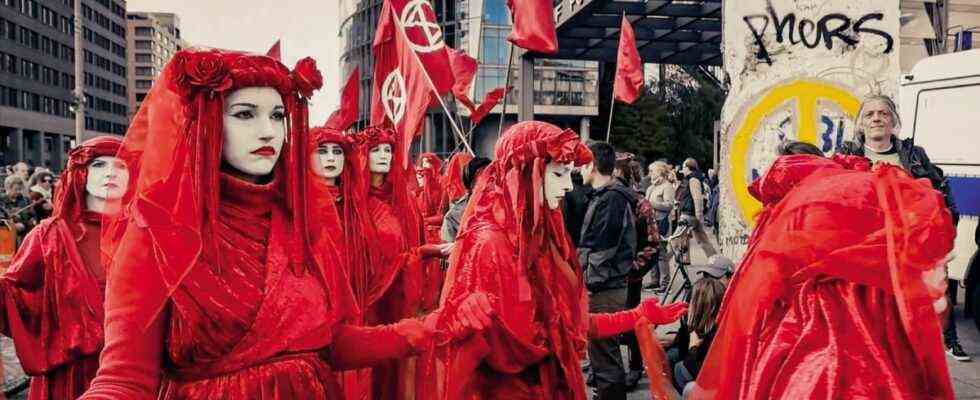Young people around the world are putting pressure on governments. “What do you want?” – “Climate Justice!” – “When do you want it?” “NOW!” Now. This is what the activists of Extinction Rebellion chant on the streets of Berlin, London and New York. Many documentaries have conjured up the global climate catastrophe, but the photographer Jim Rakete prefers to use green instead of painting in black, he collects perspectives for saving the earth and spreads the confidence that it can be achieved with radical rethinking – now.
Claudia Rinke had written a script for a film that captures the spirit of the worldwide youth movements. When looking for a director, she had the not necessarily obvious, but then very good idea of asking the photographer Jim Rakete. She had just seen a very cinematic commercial from him for a hybrid car, in the form of a long-distance call between Berlin and New York, cross-generational between him and the actress Jella Haase. Just as Rakete has been capturing personalities from the film and music scene in black and white with the camera since the 1970s, he is now approaching the young activists in color in his directorial debut with the film camera (Philip Koepsell).
Six young people and their projects represent a global youth protest movement that challenges and inspires adults in politics, business and science: Luisa Neubauer, who – instigated by Greta Thunberg – founded the German offshoot of the school strike campaign “Fridays for Future”. Felix Finkbeiner, who initiated the Plant for the Planet initiative at the age of nine, under whose direction billions of tree saplings were planted worldwide. The British Zion Lights, who is involved in Extinction Rebellion with disruptive actions. Marcella Hansch, who, with the association she founded, Pacific Garbage Screening, strives for plastic-free waters. Nike Mahlhaus, which is campaigning for the end of coal burning with Endegebiet. And the American Vic Barrett, who is with Youth v. Gov is fighting for a future in court, knowing that the consequences of the climate crisis will be felt more by people of color than whites.
Open, curious and alert, worried and confident, these young faces look at the world and into the abyss. Eloquent and convincing, inspiring and rousing, downright angry and yet always factual, they tell of their observations and their work, all in English so that they can develop their impact internationally. They are flanked and supported by many experts, researchers, analysts, economists and some prominent friends of the director, such as Patti Smith and Wim Wenders. Greta Thunberg also appears again and again, with her famous speeches on demo stages and in front of the General Assembly of the United Nations.
The white overalls of the Extinction rebels – a choreography
But don’t worry, Jim Rakete and his editor Kjell Peterson don’t just do it Talking heads lined up. In the area of tension between the individual people and the demonstrating masses, the sparks of commitment jump over. With a keen sense for images and rhythm, Jim Rakete collects and choreographs special impressions: the swarms of extinction rebels clad in white overalls who pour into the coal mining pits. The dramatic red robes and whitewashed faces of the funeral processions in which nature is symbolically buried. The tree houses of the protesters in the Hambach Forest or a few shimmering soap bubbles that burst like the empty promises of the politicians.
And again and again the young faces with their esprit and energy. The film spreads a whole cornucopia of good ideas, but also leaves no doubt that none of them alone is enough. The calls for a radical restructuring of society are getting louder and louder. The economic anthropologist Jason Hickel also calls for redistribution instead of growth and asks why a country’s economic success is still measured solely in terms of gross domestic product, why it has not long been offset against social and ecological costs in order to provide incentives for environmentally friendly approaches.
With “Now” a circle comes full circle, because at the beginning of his career Jim Rakete documented the 1968 revolt with a camera, years of highly mobile, but not exactly environmentally conscious work followed, for which the film is also a kind of reparation. Although “Now” was shot in 2019 and slowed down by Corona, the film looks extremely fresh, immediate and brand new. And finally, Jason Hickel has some good news, especially with a view to the federal election: If you ask citizens, 70 to 80 percent of them say that environmental protection is more important to them than growth.
Now, D 2020 – directed by Jim Rakete. Book: Claudia Rinke. Camera: Philip Koepsell. Music: Nils Strunk. Distribution: W-Film, 74 minutes.

